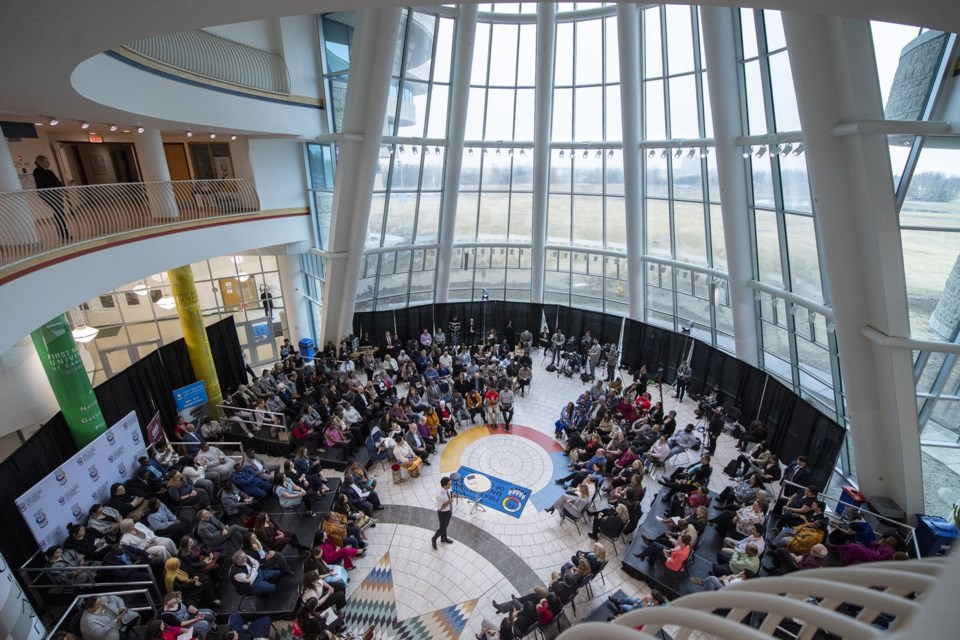OTTAWA — A new institute is in the works that would track Indigenous economic prosperity in Canada by collecting data on population, businesses, land and resources.
The First Nations University of Canada announced Thursday that it will set up the centre with help from two foundations.
"Today we celebrate a pivotal moment in our ongoing journey toward economic empowerment and self-determination for Indigenous communities across Canada," said First Nations University president Jacqueline Ottmann.
"The National Indigenous Economic Prosperity Institute will serve as a catalyst for change, promoting innovative solutions and fostering economic resilience within Indigenous communities and non-Indigenous communities."
Representatives from Deloitte, Bank of Canada governor Tiff Macklem, Sen. Brian Francis and elder Verna McGregor of Kitigan Zibi Anishinabeg were in attendance, along with others, as they announced the institute at the Bank of Canada in Ottawa.
The Mastercard Foundation is putting forward $6 million over five years, while the McConnell Foundation is adding another $1.5 million over the same time frame.
It fulfils a call to action from the National Indigenous Economic Strategy for Canada that the new research body be established to track countrywide data.
That strategy, released in 2022, was developed by 20 Indigenous organizations as a means to guide governments and institutions in reconciliation through rebuilding Indigenous economies.
"The strategy presents a blueprint to economic reconciliation and the meaningful inclusion of our people in Canada's economy," said Dawn Madahbee Leach, chair of the Core Group National Indigenous Economic Strategy and chairperson of the National Indigenous Economic Development Board.
"We are now at a point where we want to track and share the good work of the many companies and organizations that are implementing this strategy, and various government entities as well."
The strategy focuses on four pillars: people, lands, infrastructure and finance.
It emphasizes entrepreneurship, the Indigenous labour force, jurisdiction over Indigenous communities, infrastructure and developing the financial capital communities need to achieve economic and social prosperity on their own terms.
Madahbee Leach said it will operate similarly to the National Centre for Truth and Reconciliation at the University of Manitoba, which acts as a research body on residential schools, houses information gathered as part of the Truth and Reconciliation Commission and promotes public education about Canada's troubled past and present relationship with Indigenous Peoples.
"Indigenous Peoples have long been stewards of this land possessing invaluable knowledge, culture and traditions. Despite this, and contrary to the experience of many Canadians, many Indigenous communities face economic challenges that hinder their full potential," said Ottmann.
With the institution, she hopes to change that by driving research, training and policy development that will push forward economic transformations and reconciliation in communities.
Economic reconciliation is a recently popularized term to describe fostering economic relationships with Indigenous Peoples and communities, industry and government.
Indigenous Services Minister Patty Hajdu has jumped on the idea, and hosts economic roundtables with banks, industries and communities.
Her government's latest budget also includes an Indigenous loan guarantee program that is designed to make the borrowing process for communities easier, as First Nations aren't able to leverage their lands under the Indian Act.
The Conservatives have also expressed interest in the idea of economic reconciliation. Leader Pierre Poilievre proposed a new plan in February to allow First Nations to collect taxes from industry, which he said would speed up negotiations and project approvals.
Jennifer Brennan, director of Canada programs at the Mastercard Foundation, said there's no doubt systems need to change, and that the change should be led by and for Indigenous Peoples.
"Reconciliation must include economic reconciliation," Brennan said.
"The work of the National Indigenous Economic Prosperity Institute will advance that important work, and it will demonstrate a key fact that all Canadians should understand: when Indigenous youth prosper, we all prosper."
This report by The Canadian Press was first published June 6, 2024.
Alessia Passafiume, The Canadian Press




